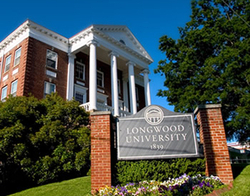When W. Taylor Reveley IV became president of Longwood University three years ago, he and the university’s Board of Visitors pledged to use improved student retention to break higher education’s relentless cycle of cost increases that are inevitably passed on to students and families.
Three years later, Longwood has established itself as the unquestionable leader within the Commonwealth when it comes to holding down cost increases. On Saturday, the university’s Board of Visitors made Longwood the first Virginia institution in more than a decade to approve cost increases of less than 3 percent for a third consecutive year.
The 2.77 percent increase in tuition and mandatory fees approved Saturday follows last year’s increase of 2.85 percent, and the year before that – Reveley’s first as president – of just 2.1 percent.
That amounts to by far the smallest three-year increase at any Virginia public university since 1999-2001, a period that witnessed a brief pause in the otherwise decades-long trend of sharply rising college prices across the Commonwealth and nation.
"We have a moral obligation, working with our partners in state government, to ensure college remains affordable for families and not just a luxury good available to the fortunate few," Reveley said. "We are doing our part, which is made possible by focusing on efficient operations, philanthropy and most importantly ensuring students stay on track to graduate, which benefits the Commonwealth, our students, and our financial strength."
Among Virginia public four-year institutions, Longwood has seen the second highest percentage enrollment increase since academic year 2012-13, at 5.2 percent.
"We’re enjoying great momentum – the upcoming vice presidential debate, record enrollment driven by our retention efforts, sharply rising alumni engagement and annual giving, and applications for the incoming freshman class that are up more than 10 percent this year," said Colleen McCrink Margiloff ’97, rector of the university’s Board of Visitors. "We have a foundation of strength to serve our students and stay true to our values as a public institution by remaining broadly affordable."
The charge for tuition and mandatory fees for in-state undergraduates carrying a full course load in 2016-17 will be $12,240 per year. Nearly three-quarters of Longwood students receive some form of financial aid that reduces that cost. In order to maintain small class sizes and the highest proportion of courses taught by full-time faculty of any public institution in the state, Longwood spends roughly $30 million more annually on education than it collects from students and families, thanks to public funding and philanthropy.
Longwood, a public liberal arts university, was founded in 1839 and is among the 100 oldest colleges and universities in the nation. It is third-oldest public university in Virginia, following the College of William & Mary and the University of Virginia.



Leave a Comment